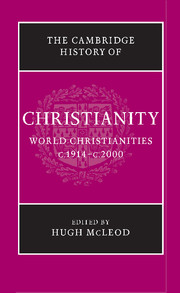Book contents
- Frontmatter
- 1 Introduction
- 2 Being a Christian in the early twentieth century
- PART I INSTITUTIONS AND MOVEMENTS
- PART II NARRATIVES OF CHANGE
- PART III SOCIAL AND CULTURAL IMPACT
- 26 Liturgy
- 27 The ‘other’
- 28 Wealth and poverty
- 29 Male and female
- 30 Christianity and the sciences
- 31 Literature and the arts
- 32 Role models
- 33 Being a Christian at the end of the twentieth century
- Bibliography
- Index
- References
27 - The ‘other’
from PART III - SOCIAL AND CULTURAL IMPACT
Published online by Cambridge University Press: 28 March 2008
- Frontmatter
- 1 Introduction
- 2 Being a Christian in the early twentieth century
- PART I INSTITUTIONS AND MOVEMENTS
- PART II NARRATIVES OF CHANGE
- PART III SOCIAL AND CULTURAL IMPACT
- 26 Liturgy
- 27 The ‘other’
- 28 Wealth and poverty
- 29 Male and female
- 30 Christianity and the sciences
- 31 Literature and the arts
- 32 Role models
- 33 Being a Christian at the end of the twentieth century
- Bibliography
- Index
- References
Summary
RELATIONS BETWEEN CHRISTIANS AND JEWS, 1914–2000
It is something of an under-statement to describe 1914 to 2000 as a significant period for Jewish–Christian relations. Two key events included the destruction of European Jewry during the Nazi Holocaust of 1933–45 and the establishment of the state of Israel in 1948. These had profound implications for modern Jewish identity and also posed powerful challenges to the Christian churches in terms of traditional attitudes and theology. Ultimately, the scope and content of any survey of Christian interaction with the Jewish other in the twentieth century are determined by these events.
One problem that must be addressed from the outset relates to the boundaries of the interaction. It is important to recognise the fragmented nature of the Jewish community in the modern world, just as for the Christian community. Ultra-Orthodox, Orthodox, Conservative, Reform, Liberal and Progressive, Reconstructionist, and a wide range of secular Jews are among some of the groups that comprise the Jewish ‘community’ that has emerged since the Enlightenment. In contrast to a common view of Christianity as being religiously or theologically defined, Jewish identity is more complex and can be expressed in ways that are often regarded as non-religious. One way, Zionism, the movement for the establishment and maintenance of a Jewish state, is in many of its forms entirely unreligious, even anti-religious. Again, a large proportion of the six million Jewish victims of the Holocaust did not, in fact, regard themselves religiously as Jews, but rather as secularists or as assimilated Christians of Jewish descent.
- Type
- Chapter
- Information
- The Cambridge History of Christianity , pp. 483 - 513Publisher: Cambridge University PressPrint publication year: 2006



